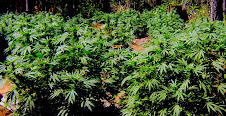Cannabis agriculture is a critical component of sustainable, organic agricultural rotations. Add to this the production of biofuels and food from the same harvest, and production of atmospheric monoterpenes, and organic hemp agriculture has the potential for making an enormous difference in the quality of life for future generations.
A report by the International Trade Centre UNCTAD/WTO and FIBL (Research Institute of Organic Agriculture, Switzerland) (2007) provides a detailed assessment of the benefits of organic farming regarding climate change. The benefits are summarized as follows (Khor, 2008):
—Organic agriculture has considerable potential for reducing emissions.
—In general it requires less fossil fuel per hectare and kg of produce due to the avoidance of synthetic fertilisers. Organic agriculture aims to improve soil fertility and nitrogen supply by using leguminous crops, crop residues and cover crops.
—The enhanced soil fertility leads to a stabilization of soil organic matter and in many cases to a sequestration of carbon dioxide into the soils.
—This in turn increases the soil's water retention capacity, thus contributing to better adaptation of organic agriculture under unpredictable climatic conditions with higher temperatures and uncertain precipitation levels. Organic production methods emphasizing soil carbon retention are most likely to withstand climatic challenges particularly in those countries most vulnerable to increased climate change. Soil erosion, an important source of carbon dioxide losses, is effectively reduced by organic agriculture.
—Organic agriculture can contribute substantially to agroforestry production systems.
—Organic systems are highly adaptive to climate change due to the application of traditional skills and farmers' knowledge, soil fertility-building techniques and a high degree of diversity.
The study concludes that: "Within agriculture, organic agriculture holds an especially favourable position, since it realizes mitigation and sequestration of carbon dioxide in an efficient ways. Organic production has great mitigation and adaptation potential, particularly with regard topsoil organic matter fixation, soil fertility and water-holding capacity, increasing yields in areas with medium to low-input agriculture and in agro-forestry, and by enhancing farmers' adaptive capacity. Paying farmers for carbon sequestration may be considered a win-win-win situation as (a) carbon dioxide is removed from the atmosphere (mitigation); (b) higher organic matter levels in soil enhance their resilience (adaptation), and (c) improved soil organic matter levels lead to better crop yield (production)."
Crucially, for farmers who have to face increased climate variability and extreme weather events in the near future, sustainable agriculture, by increasing resilience within the agroecosystem, increases its ability to continue functioning when faced with unexpected events such as climate change. For example, organic agriculture builds adaptive capacity on farms as it promotes agroecological resilience, biodiversity, healthy landscape management, and strong community knowledge processes (Borron, 2006).
Improved soil quality and efficient water use also strengthen agroecosystems, while practices that enhance biodiversity allow farms to mimic natural ecological processes, which enables them to better respond to change. Sustainable farming practices that preserve soil fertility and maintain, or even increase, organic mater in soils can reduce the negative effects of drought while increasing crop productivity (Niggli et al., 2008).
from "Sustainable Agriculture Mitigates Climate Change and has Climate Adaptation Potential"
http://www.oaklandinstitute.org/?q=node/view/494
skip to main |
skip to sidebar

Drugs don't make seeds. Herbs do.

Here the spacing between hemp stalks is even more apparent. Inches apart, not feet.

Marijuana plants are multi-branched, planted six feet apart.

This is a field of marijuana. Note these are multi-branched, exclusively female, grown with plenty of room between each plant.

This is "industrial hemp" grown in vast swaths, planted inches apart, pollen-producing males & seeded females mixed. Pollen from this field would make seeds in marijuana plants, rendering them much less salable on the black market. If the DEA really wanted to impact the marijuana trade they wouldn't be pulling up feral hemp in the midwest, they'd be encouraging American farmers to plant hemp, to naturally balance high- and low-THC producing strains of Cannabis.


Competition from chemically-based industries are the true motivation behind prohibition of industrial hemp.
14. Barack Obama, Executive Order 13603 - National Defense Resources Preparedness
17.Strategic and Critical Materials 2013 Report on Stockpile Requirements
http://mineralsmakelife.org/assets/images/content/resources/Strategic_and_Critical_Materials_2013_Report_on_Stockpile_Requirements.pdf

Preying Mantis licking hemp resin
Freedom to farm "every herb bearing seed" is the first test of religious freedom. How bad do things have to get before all solutions are considered?
PayPal
Help me help you help everyone...
If you find value in this work, please feel invited to share the good news, or if you can, lend practical support using PayPal. There is something we all can do to heal our Mother Earth. One person can make a difference but one person can’t make a difference by themselves. 🙏
Cannabis is essential not illegal.

Drugs don't make seeds. Herbs do.
Hemp harvesting in France

Here the spacing between hemp stalks is even more apparent. Inches apart, not feet.
Can you tell the difference...?
Marijuana plants are multi-branched, planted six feet apart.
"Swiss mix" marijuana

This is a field of marijuana. Note these are multi-branched, exclusively female, grown with plenty of room between each plant.
Harvesting Hemp, Noirmoutier, France 2003

This is "industrial hemp" grown in vast swaths, planted inches apart, pollen-producing males & seeded females mixed. Pollen from this field would make seeds in marijuana plants, rendering them much less salable on the black market. If the DEA really wanted to impact the marijuana trade they wouldn't be pulling up feral hemp in the midwest, they'd be encouraging American farmers to plant hemp, to naturally balance high- and low-THC producing strains of Cannabis.
"In God We Trust"
Mission Statement
The mission of the California Cannabis Ministry is to identify Cannabis agriculture as integral to a free society and essential for human survival.
Boreal Forests of the world, "The Taiga" Region
Hemp climate zone map

A word from brother Paul
The real money

Competition from chemically-based industries are the true motivation behind prohibition of industrial hemp.
Start your own individual ministry.
The California Cannabis Ministry is meant to serve everyone, as an individual expression of our Article One, Bill of Rights, "First Freedom." The freedom of religion afforded by the United States Constitution secures our natural, god-given, self-evident rights that are also also guaranteed by several international human rights treaties.
Anyone who has genuine appreciation for the Cannabis plant, for any or all of its many uses and benefits, is reminded that deep in our hearts, we are all our own ministers. I trust that others will be inspired by my example, but everyone makes their own choices. California Cannabis Ministry encourages everyone to start their own individual ministries. I believe it is spiritually and legally meaningful for each of us to openly claim our rightful place in the most ancient, truly global Cannabis culture, even if doing so is judged an act of "civil disobedience" by unobjective courts.
It is recommended that you read this entire website for the research and knowledge being passed on. The THC Ministry website also offers a wealth of essential information. You are invited to write to projectpeace@gmail.com to subscribe to the ministry newsletter and join the discussion.
"Freedom of religion is the freedom of an individual or community, in public or private, to manifest religion or belief in teaching, practice, worship, and observance. It is generally recognized to also include the freedom to change religion or not to follow any religion. Freedom of religion is considered by many in many nations and people to be a fundamental human right." -- Wikipedia
Anyone who has genuine appreciation for the Cannabis plant, for any or all of its many uses and benefits, is reminded that deep in our hearts, we are all our own ministers. I trust that others will be inspired by my example, but everyone makes their own choices. California Cannabis Ministry encourages everyone to start their own individual ministries. I believe it is spiritually and legally meaningful for each of us to openly claim our rightful place in the most ancient, truly global Cannabis culture, even if doing so is judged an act of "civil disobedience" by unobjective courts.
It is recommended that you read this entire website for the research and knowledge being passed on. The THC Ministry website also offers a wealth of essential information. You are invited to write to projectpeace@gmail.com to subscribe to the ministry newsletter and join the discussion.
California Cannabis Ministry BlogTalkRadio Show
Recommended Reading
- National Institute on Drug Abuse, Final Report, 1991-1994 http://www.thc-ministry.org/NIDA_Report.jpg
- The Economics of Prohibition, Dr. Mark Thornton
- The Emperor Wears No Clothes, Jack Herer
- The Jefferson Bible, Thomas Jefferson
UV Index
Additional References:
1. The Ho‘omaluhia or "Peacemaker" Award
2. First Freedom Project
3. US HI: OPED: 'Ice' Addiction Is Booming, Thanks To Anti-Pot Efforts
Pubdate: Tue, 2 Sep 2003
Source: Honolulu Star-Bulletin (HI)
4. 1991-94 Final Report, "Ice and Other Methamphetamine Use: An Exploratory Study"
4. An Open Letter to Hon. MICHAEL B. SHAPIRO, FLORENCE T. NAKAKUNI! and MICHAEL K. KAWAHARA
5. Cannabis vs. "Global Broiling": An Inconvenient Solution
*References to "essential civilian demand" in government documents
*6. 44 C.F.R. PART 334—GRADUATED MOBILIZATION RESPONSE
Title 44 - Emergency Management and Assistance,
§ 334.6 Department and agency responsibilities. (f)
*7. THE DEFENSE PRODUCTION ACT OF 1950,AS AMENDED[50 U.S.C. App. § 2061 et seq.]Title VII - General Provisions Sec. 708. VOLUNTARY AGREEMENTS AND PLANS OF ACTION FORPREPAREDNESS PROGRAMS AND EXPANSION OF PRODUCTIONCAPACITY AND SUPPLY [50 U.S.C. App. § 2158] Page 2, paragraph 1
http://www.fema.gov/library/viewRecord.do?id=3590
[Also, see #13. William J. Clinton Executive Order 12919 below]
8.Franklin D. Roosevelt Executive Order 9280 - December 5, 1942
Delegating Authority Over the Food Program.
9. Harry S. Truman Executive Order 10161 - September 9, 1950
Delegating Certain Functions of the President Under the Defense Production Act of 1950
10. Dwight D. Eisenhower Executive Order 10480-- August 14, 1953
Further providing for the administration of the defense mobilization program
11. John F. Kennedy Executive Order 10998 - February 16, 1962
ASSIGNING EMERGENCY PREPAREDNESS FUNCTIONS TO THE SECRETARY OF AGRICULTURE
12. Richard Nixon Executive Order 11490 - October 28, 1969 -Assigning Emergency Preparedness Functions to Federal Departments and Agencies
*13. William J. Clinton Executive Order 12919 - June 3, 1994
National Defense Industrial Resources Preparedness
15. American Presidency Project
16. MANAGING TERRORISM’S CONSEQUENCES: LEGAL ISSUES http://www.law.depaul.edu/centers_Institutes/ihrli/downloads/managing_terrorisms_consequences.pdf
17.Strategic and Critical Materials 2013 Report on Stockpile Requirements
MantisOnMarijuana

Preying Mantis licking hemp resin
Help me help you help everyone...
If you find value in this work, please feel invited to share the good news, or lend practical support using the PayPal button below, that there is something we all can do to heal our Mother Earth.








